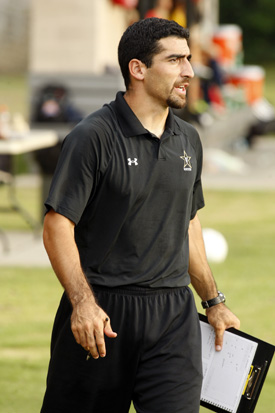April 24, 2013

Roots is a series that profiles Vanderbilt coaches, and reflects back on their lives, forming a roadmap that guides readers through the early years of their lives to where they are today.
Coaching is in Vanderbilt assistant coach Sebastian Vecchio’s blood. His father was a coach and his uncle has coached for nearly 30 years. Vecchio was destined to be a coach … just not necessarily a soccer coach.
Born and raised in the soccer hotbed of Buenos Aires, Argentina, Vecchio’s first involvement in sports was with basketball. His father, Edgardo, coached basketball at the club level and was an assistant coach on the Argentina National Team to his brother, Guillermo Vecchio, who guided the Argentinians at the 1996 Olympics in Atlanta and currently coaches the Chilean National Team.
Because of his father’s involvement with hoops, Sebastian could often be found in a basketball gym.
“I grew up with those players that you now see in the NBA such as Manu Ginobili, Fabricio Oberto, Luis Scola, and helped do stats at the games,” Sebastian said. “I went to camps and all the games, and I was seemingly always at the basketball gym.”
Basketball was his first sport and was his primary focus until he turned 12 and began playing soccer. “I just fell in love with it,” Sebastian said.
Soccer quickly became his sport of choice and he transitioned into club soccer, playing for Temperley and finding his niche as a goalkeeper.
Sebastian found immediate success on the pitch and was playing for the Argentinean U-16 National Team in a few short years.
Through his advancement in the sport, Sebastian was also chosen to be a part of a regional team in Argentina. As a part of the team, he and his teammates were afforded the opportunity to take a trip to the United States where they played friendly matches with different club teams and universities.
He didn’t know it at the time, but his visit to the U.S. would dramatically change the course of his life.
“I wasn’t aware of the system (in the United States),” Sebastian recalled. “We were just playing friendlies and then all of a sudden we were told that we can actually get a scholarship and play soccer. That was when I was first seen by U.S. college coaches.”
From his time playing in the United States, Sebastian was extended a scholarship offer by Mid-Continent University in Mayfield, Ky. He accepted the offer and played two seasons for Joe Zakowicz at Mid-Continent before transferring to Memphis, where he finished his college career and remains the school’s career leader with a 1.02 goals-against average.
For Sebastian, the opportunity to play soccer and receive an education was the best of both worlds.
 “Back home, we do not have sports at the collegiate level,” Vecchio said. “It is all at the club level. I obviously wanted to play pro like everyone in the youth system. Education is such a big part of our family altogether. My parents and my brothers all went to school and if you stay back home, you reach a point where you need to decide if you are going to play or if you are going to go to school. It was going to be a very tough decision for me, and with this I was able to do both at the same time.”
“Back home, we do not have sports at the collegiate level,” Vecchio said. “It is all at the club level. I obviously wanted to play pro like everyone in the youth system. Education is such a big part of our family altogether. My parents and my brothers all went to school and if you stay back home, you reach a point where you need to decide if you are going to play or if you are going to go to school. It was going to be a very tough decision for me, and with this I was able to do both at the same time.”
Sebastian was 17 when he arrived in the U.S. He knew just enough English to get into school and was beginning a journey in a foreign land without his friends and family to lean on.
“It took a little bit to get used to the culture,” Sebastian remarked. “The first two semesters were a big adventure.”
Sebastian’s transition was aided by a strong international presence on Mid-Continent’s roster. He was on a team with players from all over the world and they could share in similar experiences.
“It made things easier because everybody was in the same boat of being away from home to play in the States,” he said. “It really helped everyone relate to each other.”
Even though Sebastian was thousands of miles removed from home, the strong coaching influence his family instilled in him at a young age very much remained.
As a freshman at Mid-Continent, Sebastian began his foray into coaching. Because the sport is so international, his desire or ability to coach was not hindered by a language barrier. While at Mid-Continent, he coached at the club level and also taught goalkeeper lessons – all while balancing his own practice and class schedule.
Sebastian continued coaching after transferring from Memphis for his final two years and was hired as an assistant coach for the women’s team at Memphis shortly after graduating.
“I went from playing on the guys team to coaching the women’s team,” Sebastian said. “I knew most of the girls on the women’s team but I never hung out with the girls outside the field. So when I went to the coaching ranks, I had that respect right away. I was always focused on school and soccer and I wasn’t there so much for the social part.”
After four seasons as an assistant at Memphis, Sebastian moved on to Rice for a season before landing at Vanderbilt as an assistant in the summer of 2010. Sebastian currently coaches Vanderbilt’s goalkeepers and also organizes the program’s recruiting efforts.
He still makes it back to Buenos Aires at least once a year to visit family. He has two younger brothers that live in Argentina and his father is retired from coaching and now runs a newspaper and radio station. Sebastian’s older brother, Nicolas, moved to the U.S. two years after him to do his residency and now lives in Indianapolis where he has a veterinary practice.
Having come from a part of the world where soccer is such an important part of the culture, Sebastian has adjusted to the difference in how soccer is viewed in the United States.
“The main difference is that in the States, soccer is one more thing that you do,” he said. “Back home, it is basically all you do. In the United States it is kind of considered a wealthy sport and it is the other way around back home. Everybody can play and it is real cheap.”
The economics of the sport are different in Argentina and the U.S., and so is the way in which the two countries view the women’s game.
“Women’s soccer back home is not that big and they didn’t even have it when I was growing up,” Sebastian said. “It is a mentality thing in the country that you aren’t very feminine if you play soccer. It is growing very slowly. It is way better than it was a few years ago.
“When I talk to my friends and family, they just can’t believe the resources that we have and how we travel and the places that we stay and everything the university does for our soccer team.”
It’s been 12 years since Sebastian took a leap of faith and moved to the U.S., not knowing what to expect. The decision has opened doors to new opportunities and helped him continue the great coaching legacy that his father and uncle established before him.

Who was your favorite soccer player growing up?
I really liked Fernando Redondo. He played for Real Madrid and AC Milan as well as the national team too. He played center mid and was a very classy player.
What is the type of food you miss most from Argentina?
Mainly steak and how we cook and season it (think Brazilian steakhouse). Here it is a really expensive place to go and back home that is basically what you do on Sundays with your friends. We produce everything in Argentina because we have so much land, so it is very accessible.
What are the most popular sports in Argentina?
Soccer is the most popular, followed by basketball and then tennis. Really, ever since basketball won the Olympic gold medal (in 2004), the sport has grown a lot in popularity.
What is the climate like in Buenos Aires?
It is similar to Nashville. We are far enough from the equator that it gets cold in the winter and hot in the summer. We get snow every two to three years in Buenos Aires.

